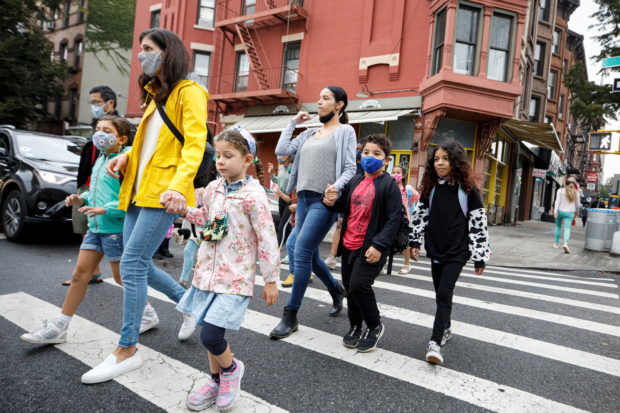Children with mild COVID-19 may not develop antibodies

FILE PHOTO: Parents walk with children to school, amid the coronavirus disease (COVID-19) pandemic in Brooklyn, New York, U.S. October 4, 2021. REUTERS/Brendan McDermid
Children who contract a mild case of COVID-19 may not develop antibodies to the virus afterward, a study from Australia suggests.
Researchers compared 57 children and 51 adults with mild COVID-19 or asymptomatic infections. Only 37% of children appeared to develop antibodies, compared to 76% of adults – even though viral loads were similar in the two groups, researchers found.
Children’s bodies also did not appear to produce second-line cellular immune responses to the virus in the same way as adults, said study leader Paul Licciardi of Murdoch Children’s Research Institute in Melbourne.
The participants in the study were all infected in 2020, his team reported on Monday on medRxiv ahead of peer review.
“Whether this also happens for the current circulating variant (Delta) requires further investigation, as well as studies to understand why children are less likely to produce antibody responses following SARS-CoV-2 infection,” Licciardi said. “Whether this means children are susceptible to re-infection is not known.”
Article continues after this advertisementExperimental oral COVID-19 vaccine
A COVID-19 booster vaccine that can be given by mouth to people who already have antibodies from vaccination or prior infection has yielded promising results in monkeys and is likely to be tested soon in humans, according to the company developing it.
Article continues after this advertisementThe oral booster uses traditional vaccine technology in which a harmless carrier virus delivers coronavirus proteins into cells on the surface of the tongue, or lining of the cheeks and throat, stimulating the production of antibodies that can block the virus before it gets a foothold in the body, said Dr. Stephen Russell, chief executive of Vyriad in Rochester, Minnesota, who led the study.
“Not only would an oral COVID-19 vaccine be more convenient and acceptable… but it might also lead to better immunity because it is being administered to the site where the COVID-19 virus typically comes into the body,” he added.
In monkeys at one week after vaccinations, antibody levels increased by nearly 100-fold, with no side effects, Russell said.
A report of the study posted on Monday on bioRxiv ahead of peer review says Vyriad is working with the U.S. Food and Drug Administration to plan human trials.
Reuters noted these research warrant further study to corroborate the findings.
For more news about the novel coronavirus click here.
What you need to know about Coronavirus.
For more information on COVID-19, call the DOH Hotline: (02) 86517800 local 1149/1150.
The Inquirer Foundation supports our healthcare frontliners and is still accepting cash donations to be deposited at Banco de Oro (BDO) current account #007960018860 or donate through PayMaya using this link.